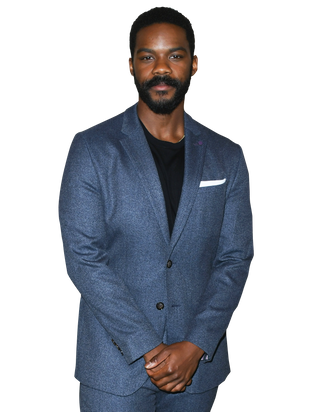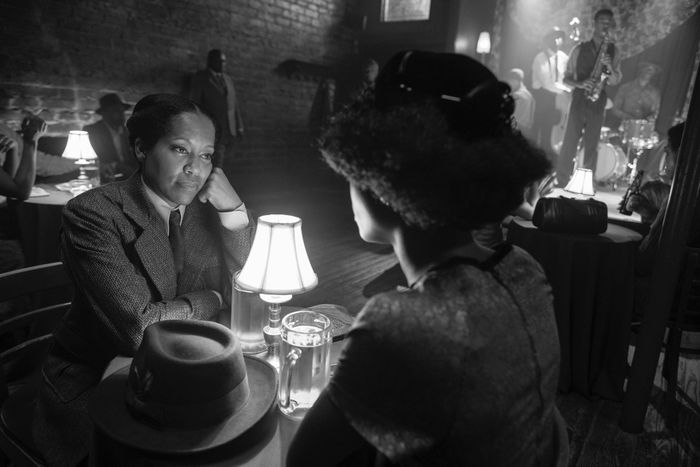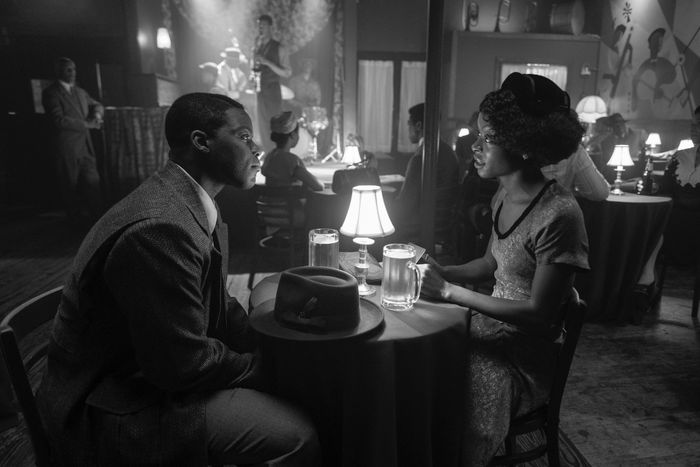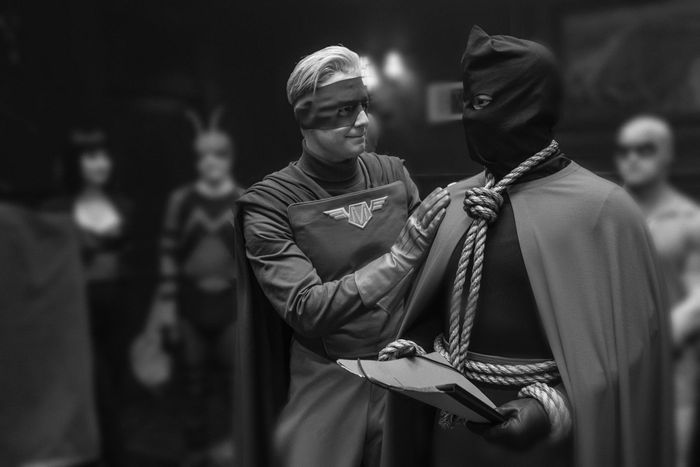
This interview contains spoilers for the sixth episode of HBO’s Watchmen.
Throughout the first few episodes of Watchmen, we’ve seen a version of the first-ever masked vigilante Hooded Justice by way of an ultraviolet TV show called American Hero Story. But in the HBO show’s sixth episode, creator Damon Lindelof and co-writer Cord Jefferson reveal the true story of Hooded Justice, one that’s entirely different from both American Hero Story and the character’s implied backstory in the original comic. After Angela Abar (Regina King) downs a bottle of Nostalgia pills, she plunges into a series of traumatic memories belonging to her grandfather Will Reeves (played by Louis Gossett, Jr. in the present). Through these memories, “This Extraordinary Being” reveals that Will was Hooded Justice, and the truth of his origin and race have been lost to history.
To depict the character within Angela’s Nostalgia trip, Watchmen cast When They See Us star Jovan Adepo as the young Will Reeves, though he alternates shots with Regina King, as Angela imagines herself in her grandfather’s position. Lindelof brought on Adepo after working with him on The Leftovers, and the actor worked closely with King on developing many of the aspects of the character. Vulture caught up with Adepo to discuss what it was like to reimagine Hooded Justice, how he and King navigated their dual role on set, and how he felt shooting the “terrifying” lynching scene that’s central to the episode.
What was it like to audition for this part? Did they tell you much?
I didn’t audition for this part. I remember being in the gym and getting a text from Damon, which isn’t something that’s way out of the blue, because Damon checks in on his friends often. It’s usually like a quick text: “How you doing? Is everybody good? Family good? Okay, love you. Bye.” He was like, “I’m going to call you in like 20 minutes.” I didn’t even know what to expect until we actually got on the phone.
Maybe a year before, I’d stopped by while the Watchmen offices were just getting started. He was asking me if I knew what my availability was a year from then. But once he called me that day and explained what the role was, within five minutes I was like, “Send me a ticket. I’m ready to get over there.”
Were you familiar with Watchmen? Did you know how the graphic novel depicted Hooded Justice?
I was generally familiar with the graphic novel, but hadn’t read it. I wasn’t really familiar with the Minutemen at all. Damon started off with the idea that we’re trying to tell this story about this man who would be a human version of Superman. Not in that he has any type of special power, but he is just a normal man with an extraordinary amount of inner strength and courage that would rival Superman’s. That’s why there’s a lot of Superman parallels in Will’s arc, like him being sent away in the trunk of the car from the Tulsa massacre.
This episode mostly takes place in Angela’s Nostalgia-pill-induced delirium. How did you film the scenes where Regina and you switch between playing Will?
Our intention was to do the entire episode in a continuous shot — Birdman was a big influence for us going into it. That meant they were going to be a lot of scenes that were really long. To be able to do the switches, both of us were always on set at the same time. It was always me and her right in each other’s pocket, basically. The camera was expertly manipulated by Chris Cuevas, who’s also from The Leftovers. I don’t want to tell too many of the secrets, but you kind of wipe the camera, and I would have to slip out of the chair and Regina would have to slip in and not make a noise.


Did you have to match each other’s expressions and mannerisms?
She and I had talked about Will’s mannerisms, his walk and his posture and his speech pattern and all of that. Regina and I spent a lot of time trying to figure out Will’s suppressed anger, how that presents itself in a black man in the 1930s who’s not able to readily show that side. We did a lot of me walking around, trying to, for the lack of a better term, peacock. I wanted to impose my body by poking my chest out and keeping my fists clenched when I walked. In that time, Will always felt threatened and always wanted to be ready if anything was to attack him.
Did you discuss how Will’s sexuality would play into his character? The comic hints at Hooded Justice’s secret relationship with Captain Metropolis, but the relationship plays out explicitly in the show.
That was a conversation that I had initially with Damon, Stephen Williams, — who directed the episode — and Cord Jefferson, who co-wrote it. They wanted to separate true facts in this reality, versus people saying that [the noose costume] was because he was a masochist and into rough sex. In our story, he wasn’t some sexual deviant. He was just a man who was attracted to other men. The audience doesn’t know how many sexual experiences Will has had with men. We entertained the thought that this wasn’t his first, but perhaps this was his most significant.
More than anything, Damon wanted me to understand that this is somebody who found another person who apparently is hiding the essence of himself. But I think Metropolis was skewed in his intentions. Even though he seemingly cared about Will, he was very adamant about not letting Will reveal himself in the public eye. You’re not totally sure if his intentions as a “costumed adventurer” are as genuine as Will’s are.
We didn’t want to make Will’s sexuality a novelty. He’s a man who is already dealing with having to hide himself, being a black man in the ’30s. Now he has to hide his sexuality. That has to be an incredibly hard thing to suppress, every day of his life, for 20 to 30 years. How he’s still living in his eighties and nineties is just beyond me.
Did you talk to Louis Gossett, Jr. about the character?
I wasn’t able to meet him, unfortunately. I really wanted to because I’m a fan. But luckily, Damon and I, and Stephen and Regina as well, had some conversations informing me of what he’d been doing. I also stayed in a very neutral place, if we’re talking about accent and cadence and speech, so that if Louis went in any other direction, they could just plug me in. This is very much Mr. Gossett’s part. I just was able to play a very specific moment in time.
You also had a role in When They See Us, which took a careful, factual approach to a moment in history. For this role in Watchmen, which is influenced by history but also has invented story, did you end up doing historical research?
When it comes to living in early-1900s America, being exposed to lynchings and burnings and murder, Stephen didn’t want to make it feel too far from reality. Day one, we talked about the lynching scene where you see the lynching from Will’s POV. That’s one of the most traumatic camera angles I’ve ever seen. I don’t know how audiences are going to take that. It was incredibly uncomfortable to see in person, but it was necessary because it adds to the trauma that Will was experiencing in his entire life. I don’t even know the words to explain how he could have felt.
What’s at stake here, past our brief discomfort, is introducing a lot of audiences to a piece of history that perhaps they didn’t even know about. When that first episode came out, there were a lot of viewers who didn’t even know the Tulsa massacre was real. It’s much more than, “Hey, we’re going to do a lynching scene.” We’re educating at this point.
What did it feel like to shoot that lynching scene?
I can only answer for myself because every actor handles it differently. This is a similar question that I was asked for When They See Us, when we were talking about the trauma that those men went through. For me, we are performing it. I don’t ever want to be that actor that puts it out there, like, “I experienced it like this man did.”
I prayed on it before I even did the scene. You do what you need to do to get into that headspace. But when it was done, I made it my business to leave it on the set. Whether I was 100 percent successful at that, I don’t think I was. It was still something I was thinking about afterward. And I think the same could be said for Regina.
I don’t want to disrespect the people who actually experienced that by saying I’ve lived it. I just think the horror of it in itself, and reading about it, and seeing it in the final cut was terrifying. I tried my best to shake it at the end, but a little bit always stays with you.
This interview has been edited and condensed.






